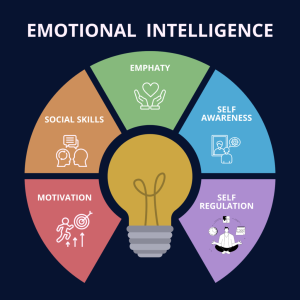Have you ever wondered why some projects succeed effortlessly while others struggle despite the best planning? What if the key to successful project management isn’t just technical skills, but emotional intelligence? In this blog, we’ll explore how understanding and managing emotions can dramatically improve your project outcomes.
Are you ready to see how emotional intelligence can transform your approach to project management?
Let’s dive in!
What is Emotional Intelligence?
Emotional Intelligence (EI) is the ability to understand one’s own feelings as well as the feelings of others. It teaches you how to regulate your emotions in a way that fosters healthier relationships and produces beneficial results. This ability is especially crucial in project management since it involves more than just planning and processes; it also requires interacting with people. Projects can confront several problems, and emotions frequently play a significant impact in how smoothly things proceed. When emotions are not managed well, they can lead to misunderstandings, disputes, and even project failure. While preparation and execution are vital, being aware of and managing emotions effectively can assist you achieve your goals. Good EI enables leaders and teams to make better decisions, remain calm under pressure, and collaborate more successfully. Teams with strong emotional intelligence typically perform better because they communicate honestly, settle disagreements quickly, and remain motivated to achieve their common goals.

Advantages of Emotional Intelligence in Project Management
a. Improved communication
Emotional Intelligence (EI) significantly improves communication in project management. When project managers have excellent EI, they can properly express their ideas to the team, ensuring that everyone knows what has to be done. They are also capable of listening to their teammates, which fosters trust and a sense of unity. Team members may have issues, thoughts, or suggestions. A project manager with strong emotional intelligence listens without interrupting and makes sure everyone feels heard. This attentive listening lets team members feel more comfortable sharing their ideas, which increases teamwork and creativity. Clear communication is especially vital when issues develop. A project manager with high EI can discuss difficulties in a calm and constructive manner, helping the team stay focused on finding solutions instead of getting stuck in frustration. Clear and polite communication helps to reduce misunderstandings and confrontations. The staff now feels more connected, motivated, and confident in their work. So, EI contributes to the creation of an open and supportive atmosphere in which everyone can share ideas and collaborate to achieve the project’s objectives. This makes communication one of the most significant advantages of emotional intelligence in project management.
b. Increased collaboration
Emotional Intelligence (EI) is important for strengthening teamwork in project management. When project managers have high emotional intelligence (EI), they foster a pleasant and supportive atmosphere in which team members feel appreciated and respected. This makes it easy for everyone to collaborate towards common goals. A project manager with high EI knows how to bring people together and promote collaboration. They can handle disagreements or conflicts in a calm and fair manner, allowing the team to remain focused on finding solutions rather than lingering on difficulties. This technique fosters trust among team members, which is required for effective collaboration.
When the environment is helpful, team members are more willing to share their ideas and attempt new things. This leads to increased innovation, and people feel safe to take creative risks and contribute their unique perspectives. Using Project Management Software UAE, project managers can streamline collaboration and enhance team efficiency by providing tools that support seamless communication, task management, and real-time updates. Better cooperation results in more efficient work completion and the ability of the team to handle obstacles jointly. Everyone works as a team, which raises morale and helps the project succeed.
As a result, EI assists project managers in creating an environment conducive to cooperation, with collaboration serving as the key to achieving innovative and effective project outputs.
c. Higher success rate
Emotional Intelligence (EI) considerably boosts the likelihood of project success. According to research, when project managers employ emotional intelligence successfully, their initiatives are more likely to succeed. This is because emotionally intelligent leaders can handle a project’s technical components as well as their team’s emotions. A project manager with high EI can remain calm in difficult conditions and make sound judgements. They also comprehend their teammates’ feelings, which helps them stay motivated and focused. This emotional awareness enables the manager to rapidly settle problems and foster better team connections. Teams managed by emotionally intelligent managers function more effectively because they feel supported and respected. This enhances communication, teamwork, and problem-solving skills, all of which are necessary for a successful project. Furthermore, emotionally intelligent project managers can handle unanticipated problems and confidently lead their teams. They guarantee the project stays on track by keeping everyone on the same page and positive. So, EI contributes to the formation of a productive, motivated, and cohesive team, resulting in a greater project success rate. It’s evident that emotional intelligence is more than simply a nice-to-have talent; it’s an essential factor in meeting project objectives.
d. Better team performance
Emotional Intelligence (EI) is an effective strategy for increasing team performance. Strong EI allows project managers to better understand what inspires their team members and what issues they may have. This knowledge contributes to a helpful and happy work environment. When team members believe their boss actually knows and cares for them, their morale improves. They feel respected and appreciated, which motivates them to do their best. A project manager with strong emotional intelligence understands how to motivate their team by recognizing their talents, celebrating accomplishments, and delivering constructive criticism. EI also enables project managers to address any problems or challenges that their team members might be experiencing. They can provide answers that make the team feel supported by listening carefully and empathically. This decreases stress and creates a sense of trust and unity within the group. As a consequence, team members are more productive and collaborate better. They communicate honestly, handle difficulties swiftly, and remain focused on common goals. So, EI assists project managers in bringing out the most in their teams by increasing morale and boosting fruitful cooperation, resulting in improved overall performance.
e. Better conflict resolution
Emotional Intelligence (EI) is essential for effective conflict resolution. In any project, disputes and misunderstandings are unavoidable. However, a project manager with high EI can handle these circumstances calmly and transform disputes into chances for growth. With EI, project managers can identify the emotions underlying a disagreement, such as irritation, tension, or misunderstanding. Understanding how others feel allows them to handle the situation with empathy and fairness. This allows them to de-escalate emotions and establish a safe environment in which everyone feels heard. An effective project manager isn’t only concerned with tackling the current problem. They want to handle disagreements constructively, finding solutions that benefit everyone involved. These fosters trust among team members and enhance group dynamics. Additionally, EI enables project managers to speak properly and politely during disagreements. This guarantees that discussions remain fruitful rather than devolve into fights. Ultimately, good conflict resolution strengthens collaboration and keeps the project on schedule. It also contributes to a pleasant workplace atmosphere in which team members feel comfortable sharing their thoughts without fear of repercussions. Using EI, project managers can turn disagreements into opportunities to build their teams and produce better outcomes.
In project management, emotional intelligence is a game changer. It improves communication, encourages cooperation, and generates a favorable work atmosphere that promotes success. By properly understanding and controlling emotions, project managers can encourage teams, settle issues constructively, and increase project success rates. Embracing emotional intelligence is more than a talent; it is a must for success in today’s dynamic and people-centered work environment.
Boost your project success with the power of Emotional Intelligence. Ready to lead with impact and inspire your team?







